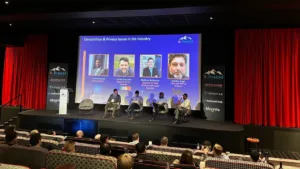By Thom Clark, CEO Frame Insights
Remember the agony of waiting a year for the next season of your favourite show? Remember the frustration of forcing yourself through filler episodes just to get to the good stuff? Well, grab your remote and ditch the disappointment, because the future of video is here, powered by Artificial Intelligence (AI), and it’s about to revolutionise the way we experience entertainment.
Imagine devouring an entire season of your favourite show in one sitting, customised just for you. Characters who understand your humour, villains who embody your definition of evil, and plot twists that leave you gasping – not because you didn’t see them coming, but because they were tailor-made to leave you speechless. This isn’t some distant utopia; it’s the reality emerging with the rise of AI video tools like OpenAI’s Sora, Pica, and Google’s Imagen.
These revolutionary platforms aren’t yet churning out special effects-laden Hollywood blockbusters but they are democratising content creation, empowering anyone with a story to tell to become a filmmaker. This might sound like bad news for aspiring Steven Spielbergs, but think again. Remember the days when only a select few had access to cameras and editing software? AI video breaks down those barriers, giving everyone a shot at the director’s chair.
But the real game-changer isn’t just accessibility. AI video is poised to personalise our viewing experience like never before. Think of it like reading a book, but instead of static words, you have moving pictures, characters who evolve based on your preferences, and storylines that adapt to your every gasp and cheer. No more generic recommendations or wading through mediocre episodes to get to the good stuff. With AI video, every show is your next favourite show written and produced especially for you.
Imagine a world where your ideal villain isn’t just some moustache-twirling caricature, but a complex antagonist whose motivations and actions resonate with your personal understanding of evil. Think of heroes who embody your values, who crack jokes that tickle your funny bone, and who overcome challenges in ways that leave you inspired. This personalised entertainment experience isn’t just passive consumption; it’s an interactive journey that reflects your inner world back at you. You can even influence the story yourself deciding whether to be shocked, tickled, or surprised.
So, how will all this affect the billions of dollars currently being invested in the content realm? Forget those jarring ad breaks that rip you out of the story. Instead, imagine characters seamlessly using the latest gadgets, sporting the trendiest styles, or casually enjoying your favourite beverage. These aren’t just props; they’re subtle, personalised product endorsements woven into the narrative. It’s influencer marketing on steroids, and with the global product placement industry already worth billions (23 to be exact), it’s a lucrative model that doesn’t need to disrupt your viewing experience.
This personalised entertainment future sounds like a dream come true, but it also raises questions. What happens to human creativity in a world dominated by algorithms? Will we become so immersed in our individual narratives that we lose touch with shared experiences and collective storytelling? These are valid concerns, but let’s not get lost in dystopian anxieties.
The rise of AI video isn’t just about replacing human storytellers; it’s about empowering them. Imagine the possibilities: AI can handle the heavy lifting of generating realistic visuals and narratives, freeing creators to focus on the truly unique elements – the heart, the soul, the human touch that only they can bring. This collaboration between man and machine can unlock new forms of storytelling, explore uncharted creative territories, and connect us in ways never before possible.
Remember, while AI might be writing the scripts, it’s still up to us to decide what stories we want to tell and how we want to experience them. Just like the written word, AI video is a tool, and like any tool, it’s ultimately shaped by the hands that wield it. So, let’s not fear the future; let’s embrace it with imagination, responsibility, and a healthy dose of excitement. After all, who knows what incredible stories await us just beyond the next algorithmic turn?









